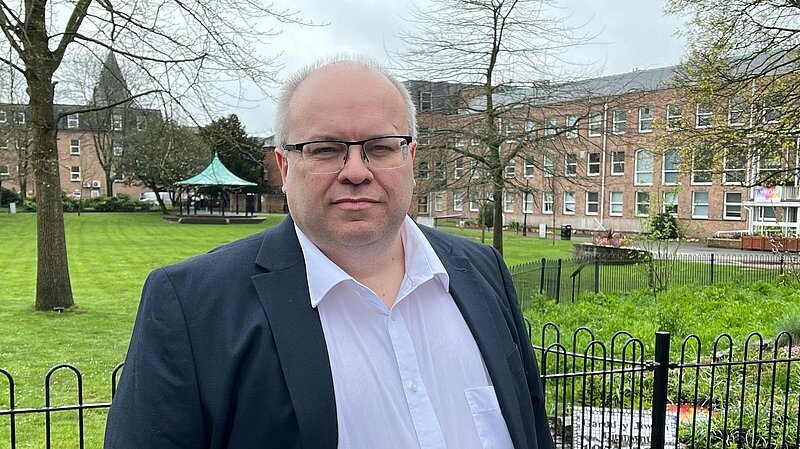Police and Crime Commissioner election Q&A: Richard Marbrow – Welsh Liberal Democrats

Wrexham.com has invited the four candidates vying for the role of North Wales’ Police and Crime Commissioner to take part in a written Question and Answer session.
On May 2 voters will head to the polls to elect a commissioner whose responsibilities include deciding the budget for North Wales Police and holding the force’s chief constable to account.
In North Wales four candidates have put themselves forward to become the region’s next PCC. These are (you can click to view their Q&A):
- Andy Dunbobbin – Labour and Co-operative Party
- Ann Griffith – Plaid Cymru
- Brian Jones – Welsh Conservative Party
- Richard Marbrow – Welsh Liberal Democrats
We contacted the four candidates with 10 questions about their plans if elected and what they feel are the biggest crime related issues facing North Wales.
You can read Richard Marbrow – Welsh Liberal Democrats – responses in full below:
- What are the key crime issues in North Wales that you think need addressing and plan on focusing on in your term in office if elected
Reducing violence and the fear of violence against women and girls including domestic violence. Catching and prosecuting cyber criminals who cause real harm to people with their scams. Making a noise in the right places to reduce the barriers that the Police face in doing their jobs such as excessive court waiting lists and poor design of public spaces.
- There’s still a lot of confusion around what a Police and Crime Commissioner is – if elected how would you raise awareness of the role and your work across the region
You have to meet people where they are. That means community events and occasions where many people gather. Events organised by the Commissioner for the Commissioner won’t work. You have to take part in events that are already happening.
- Across the UK the reputation of policing has faced fierce scrutiny in the last few years and trust has decreased. Within your role as Police and Crime Commissioner how would you work to rebuild the relationship between the public and police,
By increasing understanding. When people talk about losing trust in the Police they are often talking about an event they have seen or poor service they have received. Understanding why those individual events happened and what the explanation was either helps people to accept what occurred or helps the Police to do better the next time. Either way you have to listen to both sides and communicate.
- Retail crime has been quite topical lately with assaulting a retail worker to be made a standalone criminal offence. Where does addressing it stand in your priorities and do you have sufficient resources to tackle it.
Retail crime is immediate, often frightening and hard to apprehend people for. Promoting increased use of CCTV is one element of deterring criminals but this is an area where highly visible policing, whether by PCSOs or Officers can make a real difference. You have to increase the deterent effect of a fear of being caught.
- What relevant experience have you got for the role of Police and Crime Commissioner?
I served on Merseyside Police Authority for some years in my twenties and spent 4 years as the lead Councillor for Crime and Community Safety in Liverpool. I’m not going to claim a vast experience of more rural crime but I am willing to learn and at least I understand Police Forces and their finances.
- What are your thoughts on the 20mph policy in Wales and secondly how would you put those thoughts into action as Police and Crime Commissioner?
A good idea, badly implemented. The real argument here is whether the default should be 20mph and people have to argue for 30 or the other way round. 20 saves more lives so I think it should be the default. I would prioritise enforcement in areas where most accidents can be prevented and encourage councils to use their discretion to return some roads to 30mph.
- The cost of living crisis shows little sign of improving and Council Tax and precepts from all levels have increased. How will you work to keep the policing precept as low as possible while providing value for money?
That is all about efficiency and that can be achieved both directly by saving money on procurement and IT but also by getting the government in London to do something about the court delays that waste police time and effort. Keeping the police precept low is about supporting the police more rather than less.
- A common criticism is a lack of ‘bobbies on the beat’ and a drop in visible policing. Is this something you would look to improve if elected as Police and Crime Commissioner and if so, how? If it’s not a priority – why isn’t it?
I think we need to listen to the Chief Constables on this and her views would determine my stance. “Bobbies on the beat” is an easy catchphrase for politicians to say but sometimes it may not be the right thing. A bobby on the beat in rural North Wales is a lot less useful than one who can get to you in a car when a crime is underway. Police visibility is about more than the Police walking around a town or village. It is about the Police attending community events, explaining how they can help the public and the public can help them and normalising interactions with officers.
- What are your priorities for reducing rural crime and boosting policing in rural communities across North Wales.
People have to believe that the Police will attend when a crime is committed. I know of farmers for whom there is a real fear that they won’t attend. Fear of crime can be as painful as crime itself. Community safety guidance can help people to help themselves and sometimes a small grant can help someone secure a rural area. Designing out crime by increasing visibility in rural areas and community watch schemes can also help.
- Finally, what are your views on police funding – specifically on local and national levels and how do you think policing should be funded?
I think the mix of council tax and national funding is sensible but I also think business taxation should be looked at. Diversifying police funding across a wider range of taxes, targeted at activities that cause most crime is a good way of ensuring that funding stays consistent. There also need to be longer range financial settlements so that the Force can plan ahead and make investments in policing equipment and technology that they know will be affordable in future years.
Open statement
Being the Police and Crime Commissioner will be an honour for whichever of your 4 candidates is elected. I don’t think any of us would have stood for election if we didn’t have good intentions so I’m not going to attack my opponents but I will explain why I think that a Liberal Democrat Police and Crime Commissioner would be a good thing.
Liberal Democrats are guided by evidence when making decisions. We listen to communities and take our guidance from there. As I have talked to people through this campaign the impression I get is that people don’t want grand promises of things that will never happen. People just want everything to be a bit less broken. A little bit better.
People don’t want an easy life but they don’t want politicians to make it harder. They don’t want grand plans, they just want us to get on with fixing some stuff. And that is where the role of Police and Crime Commissioner gets important.
The truth is that none of your candidates can promise to make crime go away. None of us will be the Police, none of us will go out and catch a criminal. That’s not the job.
The job is to make sure the Police have the resources they need to do the job well. That means setting a budget that puts as much money as possible into policing and not paperwork. And money isn’t the only resource, information is also vital. The Police and Crime Commissioner should be stepping in when something goes wrong, hearing complaints fairly. Saying when the Police have got it wrong but also saying when they have got it right.
There will be people who want the moon on a stick when it comes to the Police. Visible Police everywhere at no cost to taxpayers, with no crime and 100% prosecution rates. That isn’t going to happen and I’m not going to promise the earth. But what I will promise is to work out what we can commit to and then deliver it. Work out what can be fixed and fix it. Approach every decision with an attitude not of trying to achieve perfection but trying to be better.
I’ll spread my time between our counties and communities. Making sure I listen to everyone from Anglesey to Wrexham. Freeing up the Chief Constable to do her job by staying in my lane and doing my job. Getting in the ribs of politicians in London and Cardiff to make sure North Wales policing gets its voice heard.
So my first six months would be about working out what is broken. Then I would tell everyone what that was and get on with fixing it. No huge statements of a new settlement between the public and the police, just working out what we can do to make it a bit better and getting on with it.
A Liberal Democrat emphasis on getting things done, on rehabilitation that works rather than just making people feel like some muscles have been flexed, on the real problems rather than the headline grabs would bring us real results.
If you elect me on 2nd May, I’ll start working on 3rd May. And no-one will work harder. Liberal Democrats are known for our ‘community politics’ approach of getting things done at the local level. My ‘local’ will be North Wales and I’ll work with everyone and anyone to make its policing better.
Spotted something? Got a story? Email [email protected]












